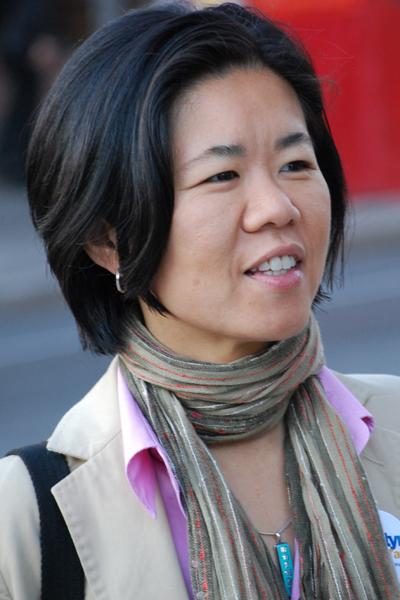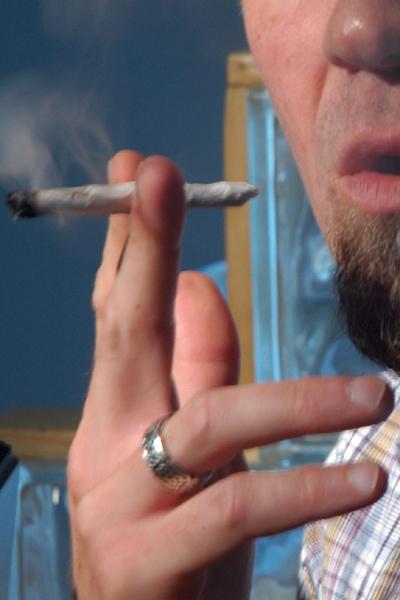
Ward 27 Councillor Kristyn Wong-Tam says there are fewer public spaces in which to protest than there used to be. Credit: Marcus McCann
Organizers of the five-year-old Toronto Freedom Festival were shocked in January when city officials told them they were being denied a permit for their annual pot-themed celebration in Queen’s Park this year. Without a permit, the festival remains on hold.
The Freedom Festival, which has grown in popularity every year, drew around 30,000 revellers in conjunction with the annual Global Marijuana March in 2010, according to police estimates.
That success has become the Festival’s biggest challenge. City officials say Queen’s Park can’t handle events at which more than 15,000 people gather without significant risk of damage to the park’s centuries-old trees and turf and without risk to the safety of gatherers.
“We’re basically saying no to use of the park this year because their crowd is so huge that the park just can’t accommodate the people with safety,” says Richard Ovens, a spokesperson for the city’s Parks, Forestry and Recreation Department. “We’re concerned about sustainability of the trees in the park, roots compacted by the crowds.”
But organizers say they proposed solutions, only to be rebuffed by officials. Gabe Simms, one of the festival organizers, says the group had proposed closing lanes of Queen’s Park Blvd to expand the festival’s space and reduce the risk of collisions with festival-goers, much like the annual Word on the Street Festival does when it occupies Queen’s Park. Street closures must be approved by police and Transportation Services.
“That wasn’t well received,” says Simms.
Simms says he tried to get correspondence going with the city last summer and fall but wasn’t given a meeting until this January, when he was told the festival wouldn’t get a permit.
“To wait until three and half months from the event that draws tens of thousands of people seems irresponsible,” he says.
Still, city officials say they’re the ones being proactive.
“There’s a process that we follow. It’s the same for everybody,” says Ovens. “We were following that process and we said here’s what went wrong. There were no surprises.”
But Councillor Kristyn Wong-Tam, whose ward includes Queen’s Park, says the festival may have “a very legitimate complaint.”
“There were a series of documented notice of violations,” she says. “They might have known it was coming, but they didn’t get notice until January.”
The Global Marijuana March is still scheduled for May 7, but now marchers will have no supporting infrastructure from the festival, including garbage bins and toilets.
“I have a meeting with Toronto police to discuss parade components on Tuesday,” Simms says. “I feel a responsibility that there will be a gathering on that day. Constitutionally protected rights to assembly and protest are there for a reason.”
Wong-Tam says she is also concerned about the effect a lack of large public gathering spaces has on civil liberties.
“If we wanted to have a revolution where would it go? Downtown Yonge Square? Nathan Phillips? Queen’s Park?” she asks. “We’re always saying, ‘You need a permit.’ Why can’t people congregate without police, EMS?
“If these folks come down to Queen’s Park North as they traditionally have done, does the city abandon responsibility? Or do we dispatch police and EMS knowing that there’s going to be people there? I ask and everyone scratches their heads and says no one’s ever asked that before,” Wong-Tam says.
City officials say they’re still in contact with the festival organizers to try to come up with a solution, but they doubt that a city park is a sustainable venue for the festival.
“We don’t really have a park that’s big enough,” says Ovens. “There are other places they could use, like Downsview Park, or the dome [Rogers Centre].”
Simms says the festival looked into using Olympic Island, but the city cited similar concerns and the logistical problem of moving thousands of people on and off the island by ferry. The city also raised concerns about illegal substances and alcohol consumption in the park during the festival, but Simms says the festival discourages illegal activity.
“This event isn’t about getting drunk in Queen’s Park,” Simms says. “It isn’t about celebrating the freedom to get drunk in a public place.”
The group even appealed to Mayor Rob Ford to intervene on its behalf.
“One of the co-founders of the Freedom Festival reached out to Mayor Ford, and the mayor actually responded, gave him a call on a Saturday, and asked for more info. We gave him a letter on Feb 14, indicating that there are concerns on our end with the process,” Simms says. “We’re certainly not looking for him to condone the activities that concerned him. Even him giving support for Bob Marley Day, he’s associated with this movement.”
Ford declared Feb 6 Bob Marley Day in Toronto and was arrested for marijuana possession and drunk driving in Florida in 1999. The mayor could not be reached for comment before press time.


 Why you can trust Xtra
Why you can trust Xtra


